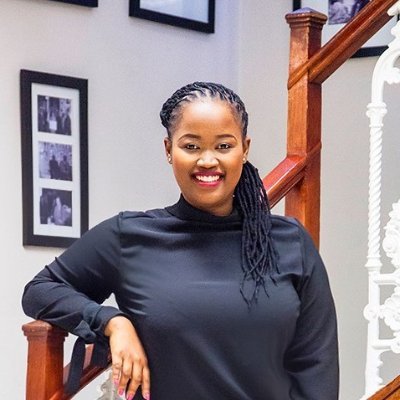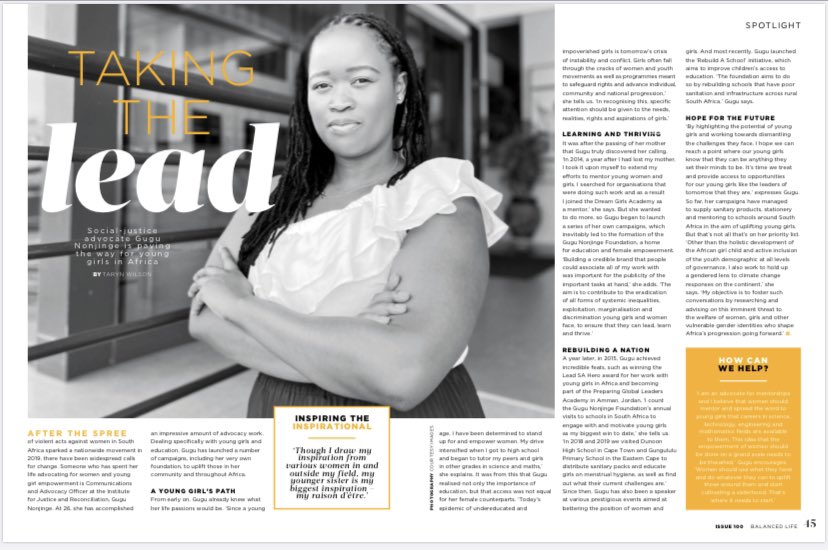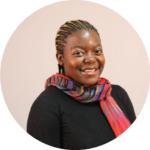Each week, frayintermedia highlights an advocacy hero doing good work on the continent and honours them as our #frayHero. Meet climate change and gender justice champion Gugu Nonjinge who is an NDP 2030 ambassador and a leading voice for climate justice in South Africa.

Q: You have been at the forefront of women’s and girls’ rights advocacy. How did you become involved in this type of work and what inspires you to continue working for social change?
A: From a very young age, I have been determined to stand up for four young girls and women and work around empowering them through different resources. My drive sort of intensified when I got to high school and began to talk to some of my peers and girls in lower grades, specifically, in mathematics and science.
In 2014, a year after I lost my mother, I took it upon myself to sort of extending my efforts to mentor young women and girls. So I searched for organisations in Cape Town that were doing such work. And as a result, I ended up joining the Dream Girls Academy which was a mentorship academy for girls that were in high school.
Since then, my work really has been mandated in mentoring girls and advocating for the advancement of their rights. Though I draw my inspiration from various women in and outside my field, I think my younger sister is my biggest inspiration. That’s what inspires me to continue working for social change and ensuring that girls’ rights, more than anything, do not stop at norm-setting, but became a reality for all young girls.
Q: What are some of the approaches and methods you use in your work?
A: I try to ensure that some of the work that I do always incorporates and includes the voice of the marginalised. If it’s working on climate change, I always ensure that those who are most impacted by climate change are represented in the work that I do. If it’s working around the advancement of girls’ rights and women’s rights, I make sure that their voices come through in the work that I do because it’s mostly advocacy and communications work and advocacy always has to ensure that the voice of the ordinary is also represented.
I also ensure that I utilise survey data such as the Afrobarometer to ensure that their voice is represented and showcased in the work itself. So those are some of the approaches and methods that I use in my work mostly. But also I believe in giving young girls and young women opportunities and chances when it comes to work opportunities.
So, I always try and ensure that those I employ or those that I work with are young and talented people, especially young girls, to ensure that their skills are utilised accurately as well.
Q: How can young women take effective action for change in the community?
A: Young women can take effective action for change in their communities by starting initiatives that speak to the things that they want to see change in their respective communities. Now is the time for young people and young women to take matters into their own hands in order for them to see effective change.
They should join advocacy and activism groups that speak to the things they want to see happening in their communities, if it works around climate change then they must start aligning themselves with organisations or other groups that organise around climate change. If it’s issues around young women going to school then they need to start finding and even start those initiatives themselves to ensure that they are included in the decisions that are being made in their respective communities.
Q: What women narratives do you feel are missing in African mainstream media?
A: Although there has been a steady increase in the number of women professions in media over the past couple of years. Mainstream press coverage continues to rely on men as experts in the field of business, politics, and even economics as well. Women in the news are spoken about in language that is sexist and are most likely to be featured in stories about accidents, natural disasters, and even domestic violence and less in stories about their professions and expertise.
There’s still a gap in African mainstream media in recognising women and their expertise, especially as experts in different fields. Hence a lack of them being invited to these media platforms to speak as experts. It’s even worse when it comes to young women and youth particularly. So in as much as there is a steady increase in the number of women professionals they are rarely recognized. I think this is because gender stereotyping in the media is still very present, the media gender gap is wide and misses the women’s perspective when it comes to reporting and offering expertise as well.

Q: What is the value of amplifying and mainstreaming the voices of African women today?
A: It is not a secret that young women and girls in Africa, and not just in South Africa alone still face massive barriers. I think historically much of the discussion on youth has been mostly male orientated, whilst the conversation around girls’ rights has mostly been focused on older women and today’s sort of epidemic of uneducated and impoverished girls is tomorrow’s crisis of instability and conflict.
We’ve seen this across the continent and in some communities in the country as well. I think girls, more than anything, often fall through the cracks of women and youth movements as well as programs that are meant to safeguard their rights and advance individual community and national progression. There’s never much that focuses specifically on young girls. All program youth work is mostly between women and youth.
There isn’t much that focuses on girls specifically, in recognizing this I’ve always advocated for specific attention to be given to the needs, realities, and even rights and aspirations of young girls. I believe that this is the kind of advocacy that is needed because there can be no true democratic governance or even transformative development in the country and in the continent at large without the full and meaningful inclusion and participation of young women and girls. There’s available data that shows that they constitute a large size of the population and more specifically, the youth population in the country. So, I definitely believe that harnessing the potential is crucial for our society.

